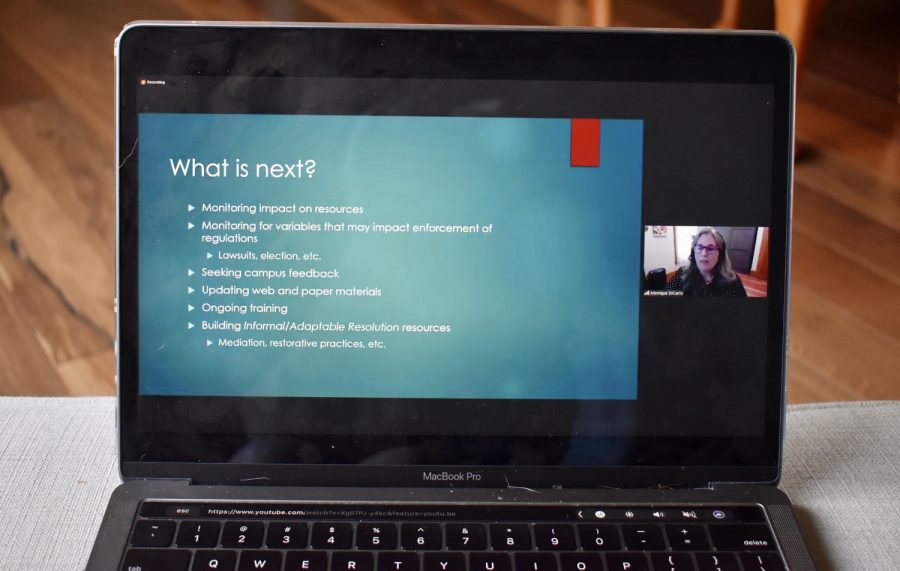Iowa’s regents universities introduce changes to Title IX policies
Iowa’s state schools introduce changes to sexual misconduct policies at the state Board of Regents meeting on Thursday.
Monique Di’Carlo, UI Sexual Misconduct Response and Title IX Coordinator, presents to the Board of Regents over Zoom on Thursday Sept. 17. Di’Carlo spoke about the changes to Title IX and how the schools where coping with the changes.
September 17, 2020
The University of Iowa reported its new interim policy on sexual harassment and sexual misconduct at the state Board of Regents meeting on Thursday. The new policy maintains the same standard of evidence for sexual misconduct cases, despite changes made by the U.S. Secretary of Education Betsy DeVos.
The new policy is in response to Title IX regulations relating to sexual assault, introduced on May 6 by DeVos. Colleges and universities were required to adhere to the regulations by Aug. 14. Iowa’s three state universities shared the changes to the sexual misconduct policies on Thursday.
Title IX is the federal law that outlaws discrimination in education on the basis of sex.
One of the new regulations by the U.S. Department of Education under DeVos was changing the evidentiary standards of sexual misconduct cases. It allowed universities to choose between a “preponderance of evidence” standard or a new, stricter “clear and convincing” standard. The UI retained the preponderance of evidence standard in its new policy.
Iowa State University Title IX coordinator Margo Foreman said universities are required to use a formal grievance process for types of allegations.
“The formal processes have to include the investigation, a live hearing, the questioning of parties throughout by using an adviser, and a determination by the objective decision maker whether or not that allegation is substantiated and that there are responsible parties to be named,” Foreman said.
University of Northern Iowa Title IX Officer Leah Gutknecht said the new Title IX policies use ‘emergency removals’ if they see the need to remove a respondent student entirely or partially from their education program during the Title IX process.
Gutknecht said the new Title IX regulations emphasize the need for a well trained team including investigators, decision makers, appeal officers, and the Title IX coordinators.
RELATED: DeVos’ Title IX changes won’t lead to major changes at Iowa schools
“Schools are now required to post that training that each team member receives along with the actual content of the training,” she said.
The UI, Iowa State University, and the University of Northern Iowa coordinated over the summer to develop the new regulations. Gutknecht said all of the institutions have been trained on the new requirements, created feedback opportunities for students and faculty on the new policies, and revised policy and procedures.
In a notice sent to all UI students and faculty, the UI’s Interim Policy on Sexual Harassment and Sexual Misconduct was replaced by two university policies including the Policy on Sexual Misconduct, Dating/Domestic Violence and the Stalking Involving Students, and the Policy on Sexual Harassment.
The UI said its new policy on sexual harassment and sexual misconduct, “created a single interim sexual harassment and sexual misconduct policy and procedures to ensure compliance with the new Title IX regulations while upholding the university values of excellence, learning, community, diversity, integrity, respect, and responsibility.”
“We all worked with one another and with the Board Office staff throughout the summer to discuss elements of the regulations and how they would be addressed by each of our institutions,” Gutknecht said
The new Title IX regulations still include rules regarding sexual assault, stalking, and domestic and dating violence. The new rules define sexual misconduct as “any unwelcome behavior of a sexual nature that is committed without consent or by force, intimidation, coercion, or manipulation.”
The university will seek feedback on the new rules during an interim period of no longer than one year.
“We recognize that the time to date by which the regulation was issued and when it was enforceable was very short and recognizing that we are going to continue seeking feedback from our campus constituencies,” UI Sexual Misconduct Response and Title IX Coordinator Monique DiCarlo said.



